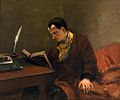José Hernández
Welcome to the Poetry Portal


Poetry (from the Greek word poiesis, "making") is a form of literary art that uses aesthetic and often rhythmic qualities of language to evoke meanings in addition to, or in place of, literal or surface-level meanings. Any particular instance of poetry is called a poem and is written by a poet.
Poets use a variety of techniques called poetic devices, such as assonance, alliteration, euphony and cacophony, onomatopoeia, rhythm (via metre), and sound symbolism, to produce musical or other artistic effects. They also frequently organize these effects intos, which may be strict or loose, conventional or invented by the poet. Poetic structures vary dramatically by language and cultural convention, but they often use rhythmic metre (patterns of syllable stress or syllable (mora) weight). They may also use repeating patterns of phonemes, phoneme groups, tones (phonemic pitch shifts found in tonal languages), words, or entire phrases. These include consonance (or just alliteration), assonance (as in the dróttkvætt), and rhyme schemes (patterns in rimes, a type of phoneme group). Poetic structures may even be semantic (e.g. the volta required in a Petrachan sonnet).
Most written poems are formatted in verse: a series or stack of lines on a page, which follow the poetic structure. For this reason, verse has also become a synonym (a metonym) for poetry. (Full article...)
Selected article

Although meeting the criteria for an epic, the poem defies simple genre classification by its use of varying themes and tones. Ovid took inspiration from the genre of metamorphosis poetry, and some of the Metamorphoses derives from earlier treatment of the same myths; however, he diverged significantly from all of his models.
One of the most influential works in Western culture, the Metamorphoses has inspired such authors as Chaucer, Shakespeare, Dante and Boccaccio. Numerous episodes from the poem have been depicted in masterpieces of sculpture and painting by artists such as Titian. Although interest in Ovid faded after the Renaissance, towards the end of the twentieth century there was a resurgence of attention to his work; today, the Metamorphoses continues to inspire and be retold through various media. The work has been the subject of numerous translations into English, the first by William Caxton in 1480. (Full article...)
Selected image
Poetry WikiProject

Selected biography

Did you know (auto-generated) -

- ... that Rudaki is acknowledged as the founder of New Persian poetry in Iran and the father of Tajik literature in Tajikistan?
- ... that the creators of Poetry for Neanderthals faced difficulties during its release because they needed a way to manufacture inflatable clubs?
- ... that creating visual art led Maya Pindyck to write poetry?
- ... that L. J. Potts translated the Poetics as Aristotle on the Art of Fiction, a title accused of "[narrowing] dangerously the wide gap between Aristotle and ourselves", but later called "creative genius"?
- ... that Handan Chun wrote a poem on the game of pitch-pot?
- ... that the Three Bards are the most celebrated poets in the history of Polish literature?
Selected poem
| A Mountain Home by Heinrich Heine |
|---|
|
On the mountain stands the shieling, |
Related portals
Topics
Recognized content
Categories
Associated Wikimedia
The following Wikimedia Foundation sister projects provide more on this subject:
-
 Commons
Commons
Free media repository -
 Wikibooks
Wikibooks
Free textbooks and manuals -
 Wikidata
Wikidata
Free knowledge base -
 Wikinews
Wikinews
Free-content news -
 Wikiquote
Wikiquote
Collection of quotations -
 Wikisource
Wikisource
Free-content library -
 Wikiversity
Wikiversity
Free learning tools -
 Wiktionary
Wiktionary
Dictionary and thesaurus

 Read
Read
 AUTHORPÆDIA is hosted by Authorpædia Foundation, Inc. a U.S. non-profit organization.
AUTHORPÆDIA is hosted by Authorpædia Foundation, Inc. a U.S. non-profit organization.













